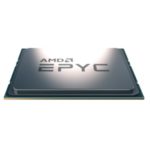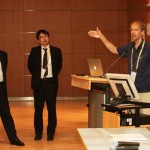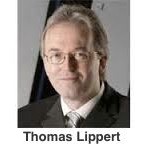Dell EMC has launched new Ready Solutions for HPC with 2nd Gen AMD EPYC processors, offer improved performance for workloads such as computational fluid dynamics, climate and weather modeling. In recent testing, the PowerEdge C6525 delivered weather modeling results in half the time as previous generation AMD EPYC processor-based servers for faster severe storm notification. “Engineered to unlock the full potential of 2nd Gen AMD EPYC processors, the new servers offer customers improved performance and an easier to manage and secure platform.”
Video: Optimizing Wind Power with the ExaWind Project at NREL
In this video, Scott Gibson discusses the ExaWind project for windmill simulation with Michael Sprague from NREL. ExaWind is part of the ECP, which is building applications that will scale to tomorrow’s Exascale machines. “Sprague also explains why the simulation is important because it demonstrates that the physics models of the ExaWind team will perform well on large computers and paves the way for the team to improve the models and direct simulation capability toward the exascale platform when it’s ready. He added that, ultimately, the team plans to simulate tens of large turbines within a large wind farm.”
International Exascale Workshop Culminates with US-Japan Collaboration Agreement
On June 22, the US Department of Energy (DOE) and Japan’s Ministry of Education, Culture, Sports, Science and Technology (MEXT) signed an agreement to collaborate on exascale supercomputing technologies for the scientific community. In a nutshell, the plan is to build a common OS kernel that can be used by all post-petascale systems, regardless of hardware eccentricities.
DEEP Project Testing Smart Acceleration for Clusters
Thomas Lippert from the Jülich Supercomputing Centre writes that the DEEP project for exascale research is pushing the limits when it comes to programming models. “In the last couple of weeks DEEP has gone through a very exciting phase – basically the ultimate baptism of fire for our concept: The new hardware has first come to life.”
Complete Archives of The Exascale Report Now Available
Welcome to the new home of The Exascale Report! Acquired by insideHPC Media in February, the complete archives of The Exascale Report are now available free of charge to anyone who registers for premium content.
Video: The Future of HPC and The Path to Exascale
“In this session we will discuss technologies recently announced by NVIDIA and how they help address key HPC challenges such as energy efficiency to get closer to achieving Exascale. We will also discuss the use of HPC in Brazil and how Brazil compares and can learn from the experience of other BRIC countries.”
Video: The Exascale Architecture
“Exascale levels of computing pose many system- and application- level computational challenges. Mellanox Technologies, Inc. as a provider of end-to-end communication services is progressing the foundation of the InfiniBand architecture to meet the exascale challenges. This presentation will focus on recent technology improvements which significantly improve InfiniBand’s scalability, performance, and ease of use.”
PGAS Approaches for Exascale – BoF Session at ISC’14
Over at the ISC Blog, Dr Mirko Rahn from Frauenhofer writes that Partitioned Global Address Space (PGAS) approaches have become a hot topic for the exascale computing domain. While there is much work to be done in this area, the EC-funded EPiGRAM project has identified the gaps to be filled when attempting to master the Exascale challenge with PGAS.
Thomas Sterling Presents: HPC in Phase Change for Exascale Computing
“Exascale computing will demand innovations greater than was required for Petaflops six years ago in terms of computer architecture, parallel programming models, and system software. It will require a break from the past through a new execution model.”
Dr. Thomas Sterling Named First Recipient of The Exascale Report’s HPC Vanguard Award
The Exascale Report announced today that Dr. Thomas Sterling is the first recipient of the HPC Vanguard Award in recognition of his outstanding leadership role in the HPC community’s strategic push to achieve exascale levels of supercomputing performance.
Dr. Sterling was presented the award at the SC13 conference in Denver today by Mike Bernhardt, Publisher of The Exascale Report™ and creator of the award. Dr. Sterling was one of six award finalists chosen by the votes from hundreds of members of the HPC community.
Thomas Sterling is Professor of Informatics and Computing at Indiana University. He serves as the Executive Associate Director of CREST and as its Chief Scientist. Since receiving his Ph.D from Massachusetts Institute of Technology as a Hertz Fellow in 1984, Dr. Sterling has conducted research in parallel computing systems in industry, academia, and government centers. He is most widely known for his pioneering work in commodity cluster computing as leader of the Beowulf Project for which he and colleagues were awarded the Gordon Bell Prize. Professor Sterling currently leads a team of researchers at IU to derive the advanced ParalleX execution model and develop a proof-of-concept reference implementation to enable a new generation of extreme scale computing systems and applications. He is the co-author of six books and holds six patents.











